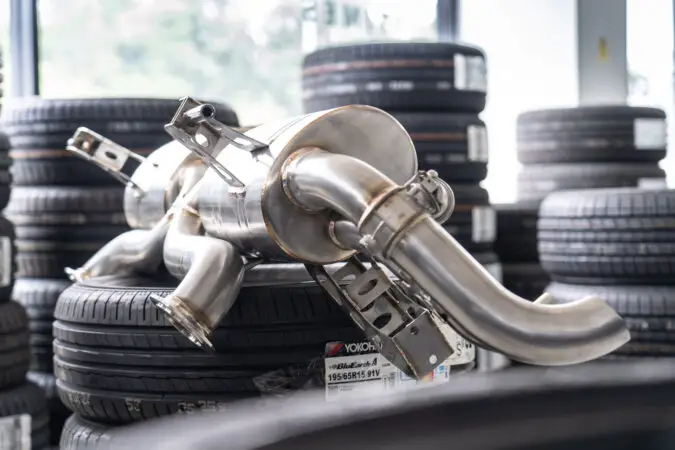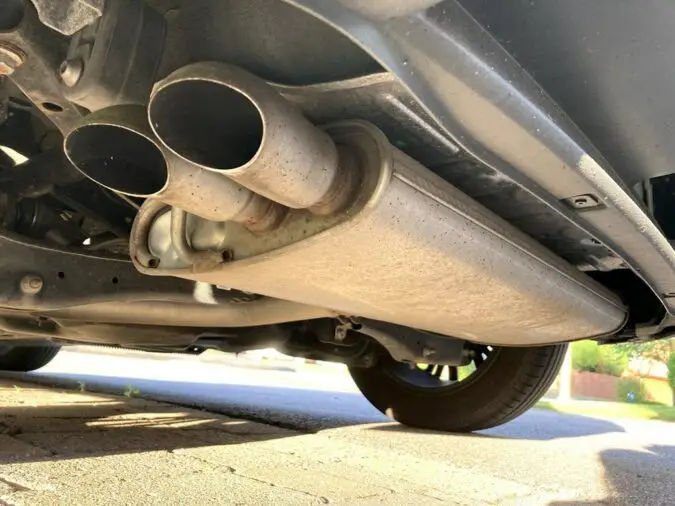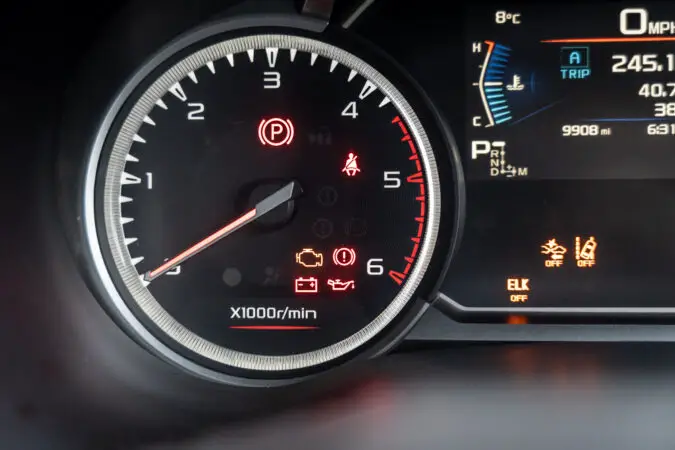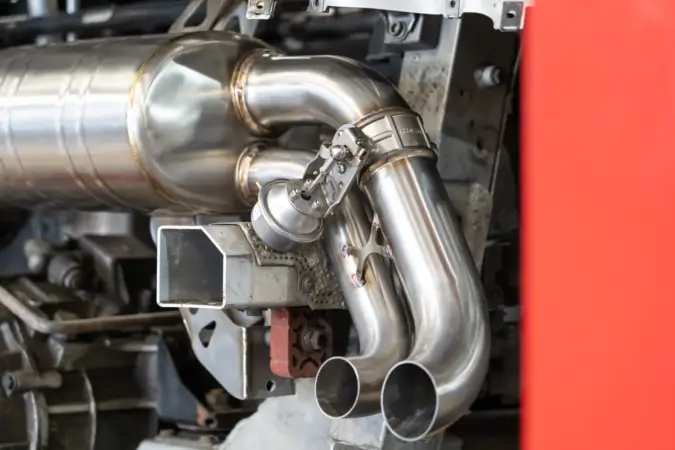Your car’s muffler doesn’t really have a lifespan estimate since they’re not a moving part. However, you may still need to replace it, usually either due to corrosion or damage. So, how much for a muffler replacement?
The costs vary greatly depending on your car’s make and model, but as a general estimate, expect around $400 for a muffle replacement. We’ll give you some examples, and discuss everything you need to know about how much for a muffler replacement and car mufflers in general. Let’s begin:
What Is A Muffler
We like to start with the basics, just in case some of you don’t quite have an understanding of the subject. This helps you to make an informed decision when proceeding with repairs. Of course, if you already know the basics of mufflers, feel free to skip this section.
The muffler is part of the car’s exhaust system that’s designed to reduce the noise made by the engine. In other words, muffle the car’s sound, hence the name muffler. This is necessary as most people prefer cars to be quiet, and there are noise regulations as well.
Before you ask, no, mufflers and catalytic converters are not the same. Non-car enthusiasts often confuse these two parts, but they are different and serve different purposes.
You’ll find the catalytic converter somewhere in the middle of the exhaust system (for more insight, check out our guide on the Ram 1500 catalytic converter location, where is the catalytic converter, and how many catalytic converters are in a Dodge Avenger). Although some cars may have it closer to the front of the car. Meanwhile, mufflers are at the very rare end, just before the exhaust tips.
While the muffler is there to reduce the noise a car makes, the catalytic converter is there to reduce the emissions a car makes. It uses precious metals (hence why it’s so expensive – as per the catalytic converter precious metal prices and why are catalytic converters stolen) to create a reaction that reduces the harmful gases that cars produce.
Types Of Mufflers
There are several different types of mufflers. But they all work by bouncing and absorbing the sound waves coming from the exhaust pipes. This reduces the intensity of the sound waves, and as a result, the car is much quieter. Here are the different types of mufflers:
1. Turbo Mufflers
Despite the name, this isn’t just for turbocharged cars. The name seems to have come from the turbocharged Corvair, which was supposedly the first car to use this construction.
Anyway, turbo mufflers use a series of perforated pipes laid out in an S-shape. These pipes don’t absorb the sound waves, but bounce them and slow down the flow of the exhaust pipes. This results in the exhaust gas flow slowing down, reducing the overall noise that the exhaust system produces.
2. Chambered Mufflers
This is the most common type in today’s cars and is considered to be the best solution to reducing exhaust noises. As the name suggests, this muffler has multiple chambers created by using sound-canceling plates or baffles.
When exhaust gases enter the muffler, the sound waves are bounced and absorbed by the baffles, reducing the noise coming out of the exhaust.
They usually have a rounded boxy shape similar to turbo mufflers. But the main advantage this has over turbo mufflers is that it allows the exhaust gases to flow more freely. Resulting in less restriction and back pressure, freeing up a little bit more horsepower from your engine.
3. Straight-Through Mufflers
Straight-through mufflers are tubular and allow exhaust gases to flow straight through them. And it uses glass fiber wrapped around it as an insulator.
Since there are no chamber or sound baffles, the straight-through mufflers aren’t great for reducing noise. However, it allows exhaust gases to flow more freely, resulting in a slight jump in horsepower.
This is mainly for tuners that want more noise from their exhaust at an affordable price. Straight-through mufflers are quite cheap, even ones from renowned manufacturers such as Borla cost less than $100.
4. Performance Mufflers
The idea of a performance muffler is to allow exhaust gases to flow more freely, which reduces backpressure and allows the engine to make more horsepower (you can also consider mods like a catalytic converter with integrated exhaust manifold). It’s also aimed to produce a louder—but still pleasant—noise for car enthusiasts.
There are various designs, but they’re usually based on the chambered or straight-through muffler construction. If it’s the former, the muffler likely has fewer baffles to allow for more noise and performance.
Additionally, these mufflers usually also have a resonance chamber. This helps to enhance the noise that the car makes, without resulting in a rough ruckus that a broken muffler or straight pipe system will produce.
Some performance mufflers now also have vacuum valve technology, often referred to as Valvetronic. These valves can open and shut—either automatically or manually—to alter the sound and performance.
When it’s shut, the exhaust will sound quieter and typically result in better torque performance. And your neighbors won’t complain. Then when it’s opened, it will allow exhaust gases to flow freely, resulting in more noise and better high-RPM performance.
This valve technology is quite expensive, and you usually have to buy an entire system, not just the muffler. It will easily cost over $2,000.
Symptoms Of A Bad Muffler
As mentioned, mufflers are not a moving part. However, a leak/hole may occur due to corrosion over the years. Or it may occur from damage, such as if you happen to scrape it or if it got hit by road debris.
Additionally, the materials inside the muffler may corrode. This results in a bad muffler that lets excess sound through, even though no external leak or hole is visible. Here are the symptoms of a bad muffler to look out for:
How Much For A Muffler Replacement, Symptoms #1: Excessive Exhaust Noise
The most obvious sign will be excess noise coming from your exhaust system. The sound your car produce may vary depending on how bad the damage is. A hole in the muffler will likely create a very loud, rhythmic noise. Meanwhile, corroded components may result in a subtler noise, but still louder than usual.
Note that leaks can occur in various parts of the exhaust system. And regardless of where it occurs, it will create a louder noise than usual. So, you’ll need to locate the noise.
Locate the sound by turning on your engine, and listening for the noise source. If it’s coming from the rear bumper or somewhere around the back, that’s likely to be a bad muffler. Inspect the muffler for any leaks or holes.
If it’s coming from the middle of the car, inspect the catalytic converter and exhaust pipes. And if it’s coming from the front or the engine, inspect the headers for leaks. The header is the front part of your exhaust system that connects the engine to the system.
Note that if your sound seems to be coming from the muffler but you don’t see any leaks, it’s likely that the internal components have corroded. This reduces the muffler’s ability to absorb sound waves, resulting in loud exhaust noises.
How Much For A Muffler Replacement, Symptoms #2: Strong Exhaust Gas Smell
This isn’t too likely since the muffler sits at the back of the car, but it can happen. If the muffler has a leak, then it will leak sound as well as exhaust gases out of it (to learn more, check out our overview of why does my car smell like gas). And those exhaust gases may enter the cabin of your car.
Again, a leak at other parts of the exhaust system can also cause this. Regardless, you’ll want to inspect the system and locate the leak. Exhaust gases are very harmful, and can cause long-term health problems (as we’ve discussed in our overview of how to get gasoline out of clothes).
How Much For A Muffler Replacement, Symptoms #3: Engine Problems
Engine problems are more likely to occur when there’s a leak at or before the catalytic converter. However, muffler leaks may cause engine problems can still happen.
When there’s an external leak, exhaust gases will leak out, and outside air and oxygen may also enter the system. The most likely problem to occur is that it will confuse your car’s O2 sensor.
O2 or oxygen sensor is a sensor that sits adjacent to the car’s catalytic converter. As the name suggests, this measures the oxygen level in your exhaust system, which reflects the air and fuel mixture that the engine is burning. The sensor then feeds this information to the Engine Control Unit (ECU), and it will make adjustments as necessary.
Remember, your car creates power by burning fuel and oxygen. This has to be at a certain ratio, which is the stoichiometric ratio (14.7 grams of air for every 1 gram of fuel). Cars typically run slightly leaner (more air) than this ratio, but can change depending on the scenario.
In any case, the ECU will decide what the appropriate ratio is. And the O2 sensor is to inform the ECU when there’s too much air or fuel in the mixture.
If there’s a leak in the muffler, outside air can enter the system and causes the O2 sensor to think that the engine is pulling in too much air.
Then the ECU will compensate by either burning more fuel or reducing the amount of air it’s taking in when it doesn’t actually need to. This can cause engine performance issues, most commonly engine misfires and poor gas mileage. And may even trigger the check engine light.
How Much For A Muffler Replacement, Symptoms #4: Excess Vibration
Sound is essentially a vibration of air, that’s how sound waves travel. And that’s why you sound muffled in water, and in outer space, no one can hear you scream. Since there’s no air.
Anyway, an exhaust leak will leak these sound waves out of the exhaust system, vibrating its surrounding components. If you hear an unusually loud exhaust noise accompanied by vibrations, you likely have an exhaust leak somewhere.
How Much For A Muffler Replacement: All The Costs
Did you know you can repair a muffler? Let’s discuss the costs of repairing and replacing a muffler:
Muffler Repair
When talking about muffler repairs, we’re referring to patching the muffler. Yes, in many cases, you can get away with just welding a patch to the muffler. This will only be feasible if it’s a minor leak.
Additionally, it won’t work if the muffler has corroded from the inside. For example, if your case has a chambered muffler and the sound baffles have corroded, you won’t be able to fix it.
Well, technically you may be able to open it up, replace the baffles, and then weld the muffler shut again. But really that’s more trouble than it’s worth, and you’re better off replacing it.
According to Water Welders, the average cost of professional muffler welding is about $280. But this cost will range anywhere between $100 to $500 depending on the extent of the damage.
You may also be able to get away with simply screwing on a metal plate to the muffler’s leak. Although we can’t really recommend this. For optimum results, we still recommend welding it or patching it with epoxy.
Muffler Replacement
So, how much for a muffler replacement? As we mentioned at the start, the cost varies greatly depending on your car’s make and model. As an example, a muffler for a 2005 Toyota Corolla will set you back around $423.
Meanwhile, a muffler for a Toyota Camry of the same year will set you back $600 before labor. Of course, these are genuine parts from Toyota, and genuine parts are usually quite expensive.
If you want to save some money, you can buy aftermarket parts instead. There are plenty of OEM-style aftermarket parts, and we found a muffler for the Camry that costs just $117.
Before you buy an aftermarket part, we recommend checking customer reviews for any complaints. Be wary of fitment and performance issues, and it’s a good idea to buy an aftermarket part that comes with a warranty.
As for the labor, a muffler replacement will usually cost somewhere around $100 to $200. Mufflers typically take no more than an hour to replace. But some cars may require more work to replace the muffler which can take up to two hours.
Overall, if you want to replace it with an OEM part, expect a muffler replacement to cost somewhere around $500 to $800 depending on the car’s make and model. But if you replace it with aftermarket parts, it should cost somewhere between $200 to $400.
Should You Straight Pipe It
Straight piping refers to removing the muffler from the exhaust system. You’re simply running a straight pipe from the catalytic converter and back. Although some would refer to it as removing the catalytic converter as well.
As mentioned, this is different from the straight-through muffler type we mentioned earlier. The straight-through muffler is still a muffler, although it’s not very good at reducing noise. A straight-pipe exhaust doesn’t use a muffler at all.
Without the exhaust mufflers, exhaust gases will flow freely. While this will likely improve performance, it will also make your car unbearably loud since there’s nothing to absorb the exhaust noise. Even four-cylinder cars might end up sounding like an old muscle car V8.
You might think “well, that’s not so bad, I’ve always wanted my Ford Focus to sound like a Mustang.” No, believe me, it’s an unpleasant noise. It’s kind of cool at first, but after a while, it will drive you mad. Not to mention, it’s illegal.
While not every state specifies how loud a car can be, every state requires you to drive with a muffler that doesn’t produce “excessive or unusual noise.” So, you’re likely to get pulled over and fined.
We’re not quite sure how much you’ll have to pay, but the fines for an excessively loud vehicle are usually about $250. So, you better replace or fix that broken muffler of yours.
How Much For A Muffler Replacement: FAQs
Got any more questions about how much for a muffler replacement? Or questions about car mufflers in general? Here are some answers that might be helpful:
How Much Does It Cost To Fix An Exhaust Leak
This depends on where the leak occurs. A leak at one of the pipes or the mufflers will cost around $280 to weld and can cost over $500 if you want to replace the component. Meanwhile, leaks at the catalytic converter and exhaust manifolds or headers are much more costly. Catalytic converters will cost thousands of dollars for the part alone. And replacing the headers can cost thousands of dollars as well, with 50 percent of the cost coming from the labor as it’s quite difficult to replace them.
How To Fix Broken Exhaust Pipe
You can fix a broken exhaust pipe by welding a patch or applying epoxy to the leak if the leak is minor. Larger leaks will require you to replace the exhaust pipe, which can cost up to $1,200 depending on the car’s make and model.
Do You Need A Muffler
If you want your car to run quietly (and you want to stay out of legal troubles), yes, you need a muffler. Pretty much every state will require your car to have a muffler. Even if they don’t specify it, the loud exhaust noise will attract the attention of the law, and you may be fined up to $250. Might as well use that money to repair the muffler.
How Much To Weld A Muffler
On average, a professional muffler welding job will set you back around $280. Although in some cases it may cost up to $500.
How Long Do Mufflers Last
This depends greatly on driving conditions. Mufflers can last anywhere between 10 to 15 years before needing repairs, provided that you don’t damage them while driving. But if you live in the salt belt, expect the lifespan to be shorter as the road salt can speed up the corrosion of your mufflers.
How Much Does It Cost To Replace Exhaust Manifold
An exhaust manifold typically costs somewhere between $800 to $1,200 to replace on average, and half of the cost will come from labor. This is because the manifold is attached to the engine, and replacing them will take a lot of time, usually around five to six hours at the very least. If you have a front-wheel drive car, it’s likely the catalytic converter is integrated with the manifold. In this case, the part alone can cost thousands of dollars.
Can A Bad Muffler Cause Loss Of Power
Yes, it can. While it’s more likely to happen when there’s a leak with the exhaust pipe before the catalytic converter, bad mufflers can also cause power loss. It will usually manifest in the engine misfiring, due to an oxygen sensor that’s getting incorrect readings.
How Long Can You Drive With A Broken Muffler
We can’t really say. If the broken muffler affects the O2 sensor, we’d say you have around two to three months before engine damage starts to occur. Although you’ll probably get pulled over for loud exhaust noise long before that.
How Much For A Muffler Replacement: Final Thoughts
To summarize, the cost to replace an exhaust muffler varies depending on your car’s make and model, and also depends on whether you want to replace it with an OEM or aftermarket part.
With an OEM part, you’ll get better peace of mind as you know it’s an original part made by the manufacturer and will work perfectly with your car. However, they’re quite expensive and will cost $500 to $800 on average. Some cars, especially luxury and performance cars, may cost thousands of dollars.
Meanwhile, aftermarket parts are a much cheaper solution. For many “normal” cars, an aftermarket muffler typically costs between $100 to $200 for the parts. Add labor into the equation and you’ll probably only have to pay about $400.
Aftermarket parts often work just as well as the OEM. Just be sure to buy a renowned aftermarket brand, and from a reputable retailer. Additionally, check customer reviews for complaints. And while it probably won’t matter much, it won’t hurt to buy an aftermarket part with a warranty.
While broken mufflers probably won’t bother you too much aside from the louder exhaust noise, they have the potential to cause long-term problems and damage to the engine. So, we recommend that you fix or replace a broken muffler as soon as possible.




